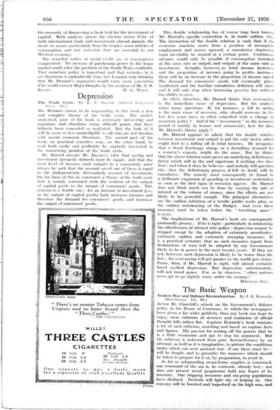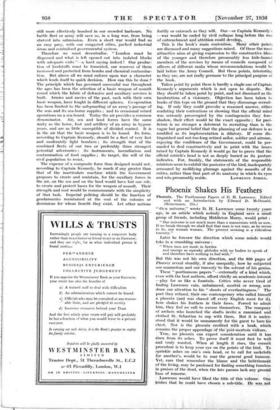Modern War and Defence Reconstruction. By J. R. Kennedy. (Hutchinson.
12s. 13d.)
The Basic Weapon
AFTER Mr. Churchill's attack on the Government's defence policy in the House of Commons, to which the newspapers have given a far wider publicity than any book can hope to enjoy, mere criticism of slowness and confusion of official thought falls rather flat. Captain Kennedy's book contains a lot of such criticism, searching and based on copious_ facts and figures. His passion for scoring off the powers that be is a little wearisome and apt to clog 'his argument. But his criticism is redeemed from pure destructiveness by an attempt, as bold as it is imaginative, to picture the conditions under which our next national war—if one there must be— will be' fought, and to prescribe the measures which should be taken to prepare for it or, by preparation, to avert it.
As far as safeguarding ocean-borne supplies is concerned, our command of the sea is, he contends, already lost ; nor does our present naval programme hold any hopes of its recovery. Our shipping resources and sea-going population .have declined. NeutrnIs will fight shy of helping us. Our Vri_es]) .convoys will be bombed and torpedoed on the high seas, and '
still more effectively bombed in our crowded harbours. No battle fleet or army will save us, in a long war, from being starved into submission. Even a short war would find us an easy prey, with our congested cities; pa- eked industrial sirens and centralised governmental system.
Therefore we must decentralise. " London must be dispersed and what is left opened out into isolated blocks with adequate exits "—a hard saying indeed ! Our produe: tion of foodstuffs must be fomented, our reserves of them increased and protected from bombs and chemical contamina- tion. But above all we must enforce upon war a character which lends itself to quick decision. How can this be done ? The principle which has governed successful war throughout the ages has been the selection of a basic weapon of assault round which the fabric of defensive and auxiliary services is built. Armies and navies of the past, each with their own basic weapon, have fought in different spheres. Co-operation has been limited to the safeguarding of an army's passage of the seas and its sea-borne supplies ; and to occasional mixed operations on a sea-board. Today the air provides a common denominator. Air, sea and land forces have the same unity as the horse, foot and artillery of an army in bygone years, and are as little susceptible of divided control. It is in the air that the basic weapon is to be found. Its form, according to Captain Kennedy, should be a fleet of very fast and moderately light bombers ; its strength that of the combined fleets of our two or preferably three strongest potential adversaries ; its • instruments, incendiarism and contamination of food supplies ; its target, the will of the civil population to resist.
The expense of a composite force thus designed would not, according to Captain Kennedy, be much if any greater than that of the inarticulate machine which the Government proposes to create and maintain, for the auxiliary forces in the air, on the sea and on the land would have but one role, to create and protect bases for the weapoh of assault. Their strength and cost would be commensurate with the simplicity of that task. Imperial policing should be the function of gendarmeries maintained at the cost of the colonies or dominions for whose benefit they exist. Let other nations fortify or entrench as they will. Our—or Captain Kennedy's —war would be ended by civil collapse long before the war of entrenchment and attrition eould develop..
This is the boa's main contention. Many other points are discussed and many suggestions raised. Of these the most attractive aims at giving expression to the constructive ideas of the younger and therefore presumably less hide-bound members of the services by means of councils composed of officers of different ranks whose recommendations would be laid before the Army Council. But these points, interesting as they are, are not really germane to the principal purpose of the book.
Taken point by point there is hardly a single one of Captain Kennedy's arguments which is not open to dispute.. But they should be taken point by point, and not dismissed as the lucubrations of a visionary. Objection has been taken to books of this type on the ground that they discourage recruit. ing. If only they could provoke a reasoned answer, either confuting their contentions or showing that the official mind was seriously preoccupied by the contingencies they fore- shadow, their effect would be the exact opposite ; for paci- ficism is no stronger a deterrent to recruiting than is the vague but general belief that the planning of our defence is as muddled as its implementation is dilatory. If some dis- tinguished and not-too-long retired sailor, soldier and airman, enjoying the confidence of the Government, could be per- suaded to deal constructively and in print with the issues raised by Captain Kennedy it would go far to prove that the official ostrich's head is not so deeply buried as its posture indicates. For, frankly, the statements of the responsible ministers seem to exhibit the posterior of the bird, inadequately armoured by mollifying plumage against the assaults of its critics, rather than that part of its anatomy in which its eyes















































 Previous page
Previous page